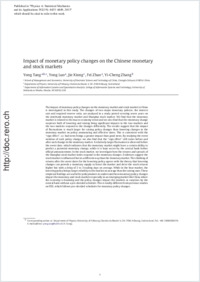Impact of monetary policy changes on the Chinese monetary and stock markets
- Tang, Yong School of Management and Economics, University of Electronic Science and Technology of China, Chengdu Sichuan, China - Department of Physics, University of Fribourg, Switzerland
- Luo, Yong School of Management and Economics, University of Electronic Science and Technology of China, Chengdu Sichuan, China
- Xiong, Jie Department of Information Systems and Quantitative Analysis, College of Information Systems and Technology, University of Nebraska at Omaha, USA
- Zhao, Fei School of Management and Economics, University of Electronic Science and Technology of China, Chengdu Sichuan, China
- Zhang, Yi-Cheng Department of Physics, University of Fribourg, Switzerland
-
01.10.2013
Published in:
- Physica A: Statistical Mechanics and its Applications. - 2013, vol. 392, no. 19, p. 4435–4449
English
The impact of monetary policy changes on the monetary market and stock market in China is investigated in this study. The changes of two major monetary policies, the interest rate and required reserve ratio, are analyzed in a study period covering seven years on the interbank monetary market and Shanghai stock market. We find that the monetary market is related to the macro economy trend and we also find that the monetary change surprises both of lowering and raising bring significant impacts to the two markets and the two markets respond to the changes differently. The results suggest that the impact of fluctuations is much larger for raising policy changes than lowering changes in the monetary market on policy announcing and effective dates. This is consistent with the “sign effect”, i.e. bad news brings a greater impact than good news. By studying the event window of each policy change, we also find that the “sign effect” still exists before and after each change in the monetary market. A relatively larger fluctuation is observed before the event date, which indicates that the monetary market might have a certain ability to predict a potential monetary change, while it is kept secret by the central bank before official announcement. In the stock market, we investigate how the returns and spreads of the Shanghai stock market index respond to the monetary changes. Evidences suggest the stock market is influenced but in a different way than the monetary market. The climbing of returns after the event dates for the lowering policy agrees with the theory that lowering changes can provide a monetary supply to boost the market and drive the stock returns higher but with a delay of 2 to 3 trading days on average. While in the bear market, the lowering policy brings larger volatility to the market on average than the raising ones. These empirical findings are useful for policymakers to understand how monetary policy changes impact the monetary and stock markets especially in an emerging market like China where the economy is booming and the policy changes impact the markets as surprises by the central bank without a pre-decided schedule. This is totally different from previous studies on FED, which follows pre-decided schedules for monetary policy changes.
- Faculty
- Faculté des sciences et de médecine
- Department
- Département de Physique
- Language
-
- English
- Classification
- Economics
- License
-
License undefined
- Identifiers
-
- RERO DOC 208688
- DOI 10.1016/j.physa.2013.05.023
- Persistent URL
- https://folia.unifr.ch/unifr/documents/303373
Statistics
Document views: 114
File downloads:
- pdf: 652
